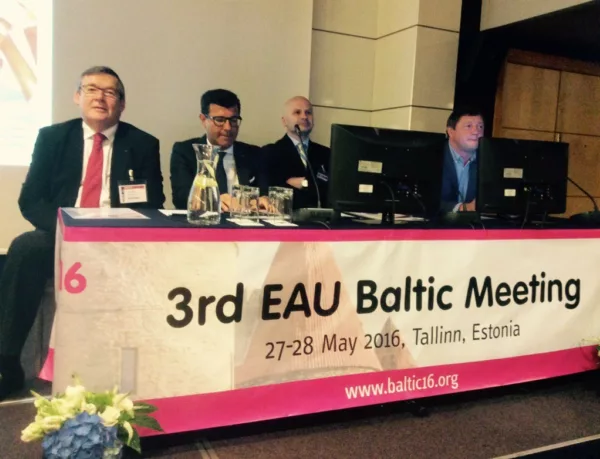3rd Baltic Meeting examines challenges in uro-oncology, andrology

With more than 300 registered participants Tallinn hosted the 3rd EAU Baltic Meeting and experts from and outside the region examined a range of challenges and prospects in the diagnosis and treatment of prostate, bladder and kidney cancers.
“The EAU is keen to continue the strong collaboration with the Baltic region and we are encouraged by the excellent work that is coming from this region,” said EAU Secretary General Prof. Chris Chapple (GB) in the opening session as he and local organisers led by Dr. Toomas Tamm (EE) welcomed both veteran and young urologists attending the third edition.
Bladder cancer treatment such as radical cystectomy and the attendant complications were tackled in the lecture by Prof. Axel Heidenreich (DE) who pointed out that radical cystectomy is linked to a high rate of complications.
“With the high rate of complications associated with radical cystectomy it is important to realise that we need to carefully select patients for this procedure,” said Heidenreich. “It is important to do a comprehensive assessment of patient history, BMI, previous surgeries and mental capabilities, among others.”
He also noted the key role of an exhaustive assessment of pre-operative imaging studies as these tools will show potential pitfalls such as the extent of cancer spread and anatomical anomalies or differences.
Heidenreich also emphasised that experience and skills refinement contribute to optimal surgical therapies as he stressed that frequently preforming radical cystectomies are vital for doctors to achieve excellent outcomes.
In another lecture, Prof. H. Leung (GB) reported on the work of his group in Glasgow regarding clinically relevant models for studies of prostate cancer progression. Among the studies being done by his group are the quantitative tissue proteomics of castrate –resistant prostate cancer and the in-vivo forward genetic screen to identify novel genes and events in lethal prostate cancer using animal models.
“It is important to have these studies conducted as these help us provide optimal treatment strategies for those men with resistant or recurrent disease,” said Leung as he expressed optimism that breakthroughs in basic research may occur in the coming years.
“Certainly we need more collaborative work and support from our colleagues in other countries,” Leung said in response to a question on international collaboration during the open forum.
Prof. Maria Ribal and Michel Sedelaar also spoke on the educational and training opportunities particularly those offered by the EAU through its European Urological Scholarship Programme (EUSP) and the various academe-based clinical and educational activities done by the EAU Young Urologists Office (YUO).
“Right now we have the challenge to consider an increasing number of applications from young urologists,” said Ribal. She said senior doctors and mentors also have the role to inspire young doctors to focus on skills training and refinement by pursuing opportunities offered by institutions such as the EUSP.
The two-day annual meeting will continue tomorrow with plenary debates, courses and six poster sessions that cover the whole range of urology. More than 100 abstracts were submitted and the best submissions will receive cash awards at the end of the meeting.


